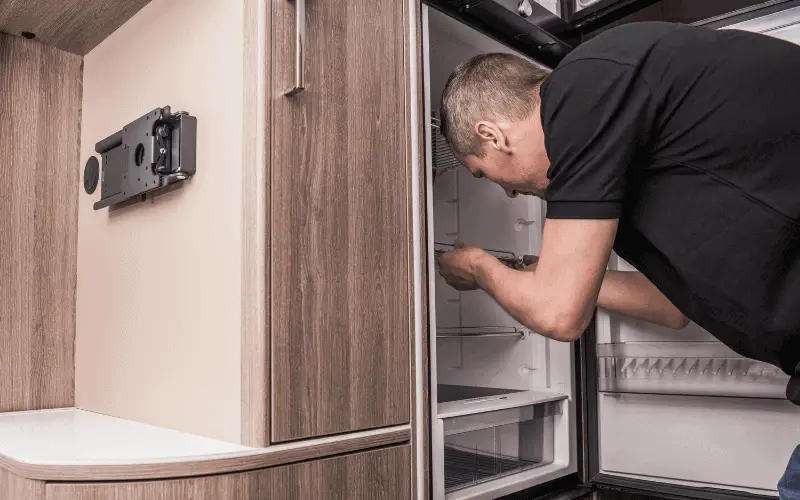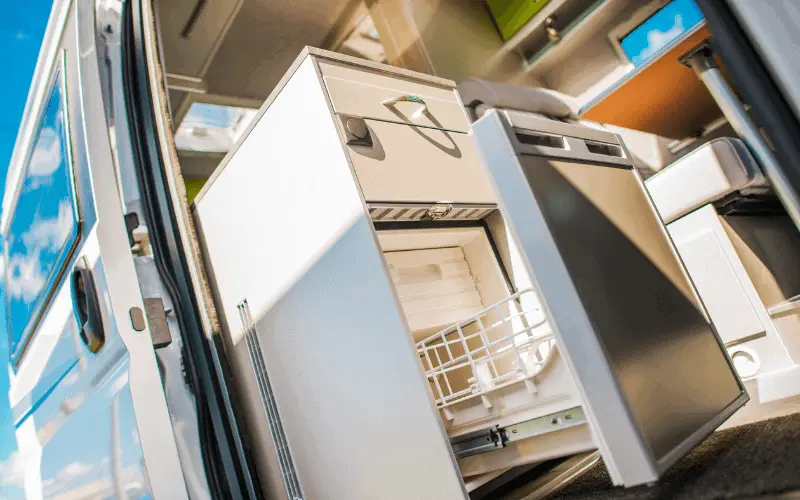Published Date: September 6, 2020
Last Updated on November 29, 2022 by Camper Front
While you might have to give up a lot of comfort when living in an RV, having a cold beer on a sunny day isn’t one of them.
You can still have to keep your fridge running by plugging your RV into the campsite’s electrical outlet, and you are good to go. But what happens when you are on the road with no steady source of electricity?
That is why knowing how to keep the RV fridge cold while driving is a rare skill. At least, you can keep your items from going bad before you reach your campsite.
Here are some ways to do that.
Table of Contents
How to Keep RV Fridge Cold While Driving
There are different sources of power for an RV refrigerator, which include:
- Propane tank
- 120V AC
- 12V DC
Using a Propane Tank

Many people are skeptical about using propane while driving, and honestly, their fears are not irrational.
Now, it must be said that propane is an excellent way of keeping your fridge at its coldest for days while driving, and many people swear by it. But with propane running in a moving vehicle, things can go wrong in a split second.
You might have to make a sharp turn, move to a different lane to avoid road debris, or come to a sudden stop, or even an item in your fridge can cause a breakage in the propane line. This gas is also very volatile and highly flammable; just a tiny spark can start a fire or explosion.
And even if it doesn’t result in a fire outbreak, you are still susceptible to various health hazards such as breathing difficulty, headache, and even seizures just by inhaling the gas.
It is against the law in some states to drive with propane running or go through a tunnel with it. But if you decide to pull through with running your refrigerator with propane while driving, you have to make sure you periodically inspect the propane lines and make sure that all tanks are tightly secured.
And if you happen to smell even a potential leak while on the road, you should turn off the refrigerator and make sure not to run the system until the leak is diagnosed and properly repaired.
It is also recommended to have a professional inspection performed once a year, just to make sure that everything is in good working order.
Read Also: How To Heat Up a Camper Without Propane
Using 120V AC Refrigerators
A purely 12 Volt electric refrigerator or any refrigerator that primarily tends to run on onboard electricity totally relies on a generator or a secondary source of electricity.
They often rely on the onboard RV power converter to help maintain its battery charge, as well as many of its other electric components.
If you don’t have a functioning generator or one without enough power to run your electric refrigerator, it could turn your electric refrigerator into an overly complicated cooler; in other words, your refrigerator would basically be useless while on the road!
A good tip is to keep a spare battery with you on a long trip, but depending on how long your journey might be, that might run out as well. Adding a wind or solar panel to your RV might also come in handy and will help to keep the system charged up.
Electrically powered fridges have a bit of a reputation for not being as effective at cooling, especially when it is overloaded with food.
It is recommended to keep an ice pack or two at the top of the refrigerator to help offset any thermal inefficiency.
Using a 12V DC Battery
This method of power is only found in three-way fridges, and with it, you don’t need to run your propane tank or your generator to keep your fridge cold all you need to do is simply switch it to 12V DC, and you’re all set!
It uses your engine to recharge its batteries as it runs, and since we are looking for ways to keep your fridge cool while driving, so you don’t have to worry about your batteries running out as long as your engine keeps running.
However, powering your fridge with a 12V DC can be detrimental to your batteries and alternator. Your RV’s alternator converts energy from your engine into a needed charge for your battery.
But If your fridge is continuously draining your batteries, your alternator will need to run concurrently to replenish the charge, which can affect its lifespan tremendously.
If you plan on running your fridge frequently on 12V DC, You may want to add a second alternator to your RV in order to reduce the strain on your RV’s power system. RV batteries also have a finite lifespan.
So After a certain number of charge-discharge cycles, their efficiency will drop, and continue to get low until the battery dies completely.
If you run your fridge on 12V DC, you have to constantly check the temperatures both inside and outside. Because when it’s hot outside, your batteries will drain faster and will overheat easily, especially when a high-powered appliance like a refrigerator is drawing power from it.
Using a Generator
Most RV fridges are two-way or three-way, which means they can use both electricity and propane. So if you happen to snag yourself any of these types of fridges and you are not in line with using propane while driving, you can actually power up your refrigerator with a generator.
Your generator, whether built-in or external, can provide up to 120V AC power to help run your fridge while driving. However, if you intend to use this method, you have to make sure that you’re fueled up before you hit the road.
Because generators that share your RV’s fuel supply are built to shut off automatically when you fall below a quarter tank of fuel, so you won’t be able to power your fridge until you fill up again.
There are also generators that run on propane; with these ones, the same precautions have to be taken with refrigerators that run on propane. If it’s your only option, you have to be extra careful with it and ensure to turn off the generator when filling up your tank or before going under tunnels.
You will also have to look out for propane prohibition signs as some roads and bridges in some areas prohibits the use of propane.
There’s also the problem of noise, as generators can be quite loud, which can be headache generating not for you alone, but you might also draw the attention of the police if you happen to drive through a quiet suburban area.
Running a generator inside your RV also poses a problem of carbon monoxide poisoning, which is very deadly.
You have to find a way to channel the fumes outside your RV. Some generators tend to have a limited amount of power they can supply while the RV is in motion due to safety and fuel conservation purposes.
And due to the fact that a fridge uses a lot of power, your generator may not be able to run it while you’re driving. So you might need to try another method of keeping your fridge cool while driving.
How to Keep Your Fridge Cool While On The Road Without Electricity

Reduce the Number of Times you Open the Fridge Door
While on the road, try to limit the number of times you open the fridge door. If you must open the fridge door, try to plan ahead of time as to what you need so that you can reduce the number of times you open the door as well as the length of time the door stays open.
If you have people riding with you, you can try running this through them; this is to ensure the fridge can maintain as much coolness as it can, as the continuous opening of the refrigerator will replace the cold air with the room’s temperature air. You can also use a cooler to store the food and drinks you will need while on the road.
Turning on Your Fridge The Day Before Your Trip
The day before your trip, you can turn up the fridge’s coldness to the coldest setting and let it run overnight. So, when you unplug the fridge and start your journey, everything inside it will be freezingly cold; this will buy you some time and keep your stuff cold for several hours.
Adding Ice Cubes
You can also add ice cubes or ice bags to the fridge’s freezer to help it maintain low temperatures for a more extended period. The ice will melt eventually, so you need to ensure you have enough water containers in order to prevent water from dripping all over your food supplies.
Filling up Every Space
Filling up every space in your fridge with essential items is a great way to keep your refrigerator colder for longer.
Reducing the space between items in the fridge will reduce movement and spillage. Instead of filling the space up with any items, try to fill it up with beverages as they tend to hold up cold more efficiently.
Read Also: How to Keep an RV Warm in the Winter
Conclusion
Knowing how to keep the RV fridge cold while driving is a critical way to prevent your food from going bad.
Interestingly, there are many ways to do this, as shown in this guide. Just make sure to opt for safe ways that would not pose a greater risk than spoilt food.

